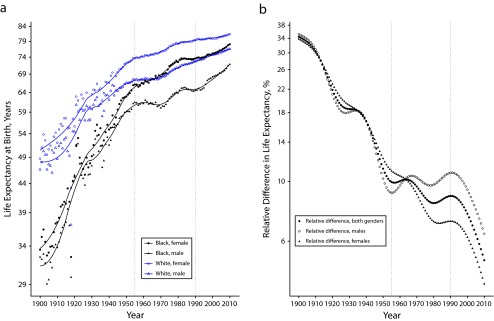Updated, Saturday, December 31, 2022, 1:00 pm CST
Why Black Men Die Early ~ Examining the shortened life expectancy of Black men and the challenges of single black mothers.

Why Black Men Die Early ~ The Life Expectancy of Black Men Has Dropped by Three Years
When the low life expectancy rate of Black men is mentioned, the automatic assumption is that it is the result of gun violence. A constant narrative has been written about Black-on-Black crime to counter the demand for police reform. While crime and violence are an issue in the Black community (as in any poverty-stricken environment), the concept of Black-on-Black crime is invalid because it fails to acknowledge the existence of same-race violence within other groups. I have written extensively on the Black-on-Black Crime Myth![1]
Generally speaking, violent crimes, including murder, are proximal. Department of Justice data reveals that 84 percent of White people who are murdered are killed by other Whites. The Black-On-Black crime argument is invalid until we have a category that acknowledges White-On-White crime and Asian-On-Asian crime.
The truth is that the low life expectancy of Black men — a number that is on the decline — is far more subtle and nefarious than the seemingly obvious postulation that it is a simple result of violence.
The most recent studies on life expectancy reveal that Black men have lost three years just over the last two years alone.[2] This decline is the largest since World War II, and the life expectancy gap is the widest since 1998 and at a 15-year low overall.
Non-Hispanic Black men have the lowest life expectancy rate of any group. According to the extant data, African Americans live six years less than Whites — with Black men absorbing the predominance of this deficiency.
Underlying health issues and the lack of adequate health care are contributing factors that cannot be ignored.
When discussing Black male health disparities, it is imperative to view them within the larger context of public health, community wellness, and family formation. It is vital to recognize both ecological and individual factors that determine t health and wellness across the life span of an individual.
Over the last 111 years, life expectancy for all major demographic groups has improved; however, Black men continue to have a substantially lower life expectancy at birth than Black women, White women, and White men.[3]
In 1900, the estimated life expectancy for White men was 46.6 years; for non-White men, it was 43.5 years; for White women, it was 48.7 years; and for non-White women, it was 33.5 years. By 2011, the life expectancy for White men was 76.6 years; for Black men, it was 72.2 years; for White women, it was 81.1 years; and for Black women, it was 78.2 years. For both genders, the relative difference in life expectancy declined from a high of 34% in 1900 to a low of 4% in 2011 (Figure 1b). Relative differences in life expectancy declined steadily until 1960, then plateauing for males and females until 1990. The plateau in relative ratios for men probably reflects an increase in mortality from homicide and HIV for young to middle-aged Black men. After 1990, the relative differences declined steadily for both men and women, reflecting annual increases in life expectancy (Dews, 2021).

For those who still want to make the argument that the low life expectancy rate for Black men is due to a propensity for violence in young Black males, it is worth noting that the same phenomenon is present for Black men at age 65. (Dews, 2021)
Recently, a barrage of announcements of Black male celebrity deaths has hit the airwaves. What has been overwhelming is the age of these men. None of these recent announcements involved a Black man over the age of 66, with the vast majority falling under 57. It is worth noting that none of these deaths were due to any form of violence and definitely not any form of fratricide.
So, if violence isn’t the primary contributor to this phenomenon, what is? It is a combination of things
The Ravages of Racism
A wealth of pragmatic and empirical data exists that points to the fact that racism, or even perceived racism, gradually and viciously diminishes its victims. Black men are not exclusively succumbing to racism, but it is effectively identified as one of the quiet killers contributing to the declining life expectancy among Black men. According to Lisa Wade, Ph.D., “directly and indirectly racism kills.” A peer-reviewed study by PLOS One supports Dr. Wade’s assessment.
For instance, no other person in the United States knows the horrifying feeling of seeing red and blue lights in the rear-view mirror, and that is not even close to the inherent fears and concerns that Black men have to deal with when it comes to racism
The Negative Impact of Stress
Chronic stress can wreak absolute havoc on the body’s immune system and its organ function. When a person is in a stressful situation, the brain is triggered to release cortisol and adrenaline into the bloodstream. This reaction is a survival response and is meant to last several minutes — long enough to take immediate action and get out of harm’s way. Once the individual gets out of harm’s way, adrenaline and cortisol levels decline, and the heart rate goes back to normal. What happens when a person is experiencing chronic stress triggered by any number of challenges, real or perceived? The elevated and sustained level of cortisol in the bloodstream can lead to a surfeit number of physiological consequences, including heart disease, high blood pressure, migraine headaches, fatigue, insomnia, and depression.
Wage Disparities
Wage disparities along racial lines still exist despite the practice being made illegal by the Civil Rights Act of 1964. The fact is that socioeconomics has a mastodonic impact on the differences in the death rates between Black and White fathers. Due to socioeconomic influences, White fathers and White fathers deal with stress differently. The White goes to a therapist where the Black man may retreat to escapism by visiting a liquor store. Black men also have a fundamental distrust of doctors that is rooted in historical experiences.
The merging of these factors has also led to a rise in attempted suicides among Black men. New data reveals a nearly 80 percent increase in suicide attempts among Black male adolescents.
According to a study conducting by Indian and Purdue Universities, young Black men are treated as stronger and older but don’t have people to talk to about vulnerability. Alfiee M. Breland_Noble, Ph.D. (Founder of the AAKOMA project) calls it an awful perfect storm of merging factors.
Cultural Health Implication
Let’s face it; while dad bods are all the rage now, the truth is that the U.S. is experiencing an obesity crisis. Black men are not exempt from this crisis and based on cultural influences. Their eating habits put them at a more significant risk of becoming obese.
To measure the significance of this factor, view some of the negative health implications directly associated with obesity:
- Type 2 Diabetes
- Coronary Heart Disease
- Cardiovascular Complications
- High Blood Pressure
- Leg Swelling & Blood Clots
- Stress Incontinence
- Cancers: colon, gallbladder, breast, uterus, esophagus, prostate, cervix, or pancreas
- Sleep Apnea
- And more
The truth is Black men will have to make some remarkable changes to reverse this trend. Some environmental issues are out of our direct control, but we must learn how to manage our responses to them. It is essential for Blacks, in general, to be aware of this phenomenon so that we don’t directly contribute to it instead of mitigating it.
Support The Odyssey Project
Donate[1] (Wallace, Addressing the Black-On-Black Crime Argument, 2016)
[2] (Writer, 2021)
[3] (Bond & Herman, 2016; Dews, 2021)

In their piece on the challenges facing Black men, Richard Reeves, Sarah Nzau, and Ember Smith explain that life expectancy is lowest for Black men compared to other groups both at birth and at age 65. “For white men,” they write, “life expectancy at birth is about 6 years lower than at age 65. But for Black men, that gap is over 9 years—showing that Black men are more likely to die prematurely.” This and the many other facts they cite in their piece on the challenges facing Black men lead Reeves, Nzau, and Smith to call for a “New Deal for Black Men.”

In their new essay, Andre Perry and Carl Romer explore approaching student debt cancellation by wealth, not by income. As tuition costs have risen far more than wages and inflation, they observe, so too have increased amounts of borrowing and student debt. “The problem is especially pertinent for Black households,” they note, “for whom a lack of generational wealth risks making student debt a long-term financial burden.” The wealth disparity between Black and non-Black people means that Black households are not building as much wealth that can help pay off student loans. Perry and Romer argue that “because student debt disproportionately harms the wealth-poor—and the Black wealth-poor in particular—student debt cancellation could be a powerful tool in dismantling institutional discrimination and shrinking racial wealth disparities if implemented correctly.”

“America has a wage problem,” write Sifan Liu and Joseph Parilla in a new essay. “The COVID-19 pandemic brought the low-wage crisis to new heights, as unemployed and underemployed low-wage workers—particularly women and people of color—face severe economic insecurity.” Whereas 44% of all U.S. families before the pandemic did not earn enough income to meet all their living expenses, the chart demonstrates that households headed by women, Black and Latino or Hispanic individuals, and those with less than an associate’s degree are even more likely to be struggling than most. Read their essay to learn more about these data and solutions for local and regional policymakers to create inclusive economic recovery strategies with family-sustaining wages.
Support The Odyssey Project
DonateReferences
Bond, M. J., & Herman, A. A. (2016). Lagging Life Expectancy for Black Men: A Public Health Imperative. American Journal of Public Health.
Burrell, T. (2010). Brainwashed: Challenging the Myth of Black Inferiority. New York: Smiley Books.
Chae, D. H. (2015). Association between an Internet-Based Measure of Area Racism and Black Mortality. PLOS One.
Cooper, A., & Smith, E. (2010). Homicide Trends in the United States. United States Department of Justice.
Dews, F. (2021). Charts of the Week: Black men’s life expectancy; student debt and Black households; struggling families. Brookings Institute.
Division, C. (2015). Expanded Homicide Data Table 6. Federal Bureau of Investigation.
Mock, B. (2015). The Origins of the Phrase Black-On-Black Crime. U.S. Uncut.
Wallace, R. (2016). Addressing the Black-On-Black Crime Argument. The Odyssey Project Research Journal.
Wallace, R. (2016). Racial Trauma & African Americans. The Odyssey Project.
Wallace, R. (2017). Born in Captivity: Psychopathology As a Legacy of Slavery. Houston, TX: Odyssey Media Group & Publishing.
Writer, S. (2021, February 25). CDC: LIfe Expectancy of Black Men Has Dropped by Three Years. Digital Daily.

